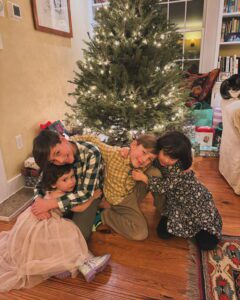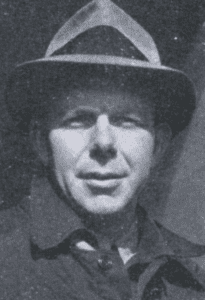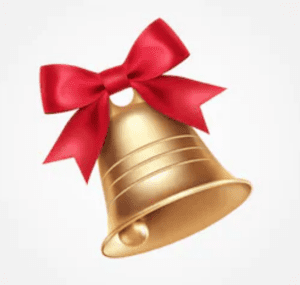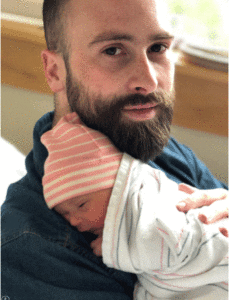When my wife, Nancy, was due to give birth to our daughter, Abigail, we’d packed our bags for the hospital and were ready to go when the contractions started. I…
When my wife, Nancy, was due to give birth to our daughter, Abigail, we’d packed our bags for the hospital and were ready to go when the contractions started. I remember that feeling, the quickening of my heart, the excitement of heading into the experience as if it were a class four white water rapid, thinking I was ready but fearing I might not be – who could ever know?
This time, it was a call from Abigail that told me she was going into labor.
I’d just had a relaxing glass of Scotch and was watching TV. When I picked up the phone I expected a casual check-in call, but it was a different story. Abigail and her husband, Ryan, were at the hospital already. Contractions were steady. And because the baby was breach, there would be a C-section. In two hours. The rush of emotion and excitement all came back to me as if it were Abigail being born and not my grandson. I told Abigail I’d be driving down as soon as possible.
Nancy, at this time, was on a business trip, and I knew she’d be in a bit of a panic. I didn’t want her to feel badly for not being there, and was resolved to keep my calm and reassure her as well as my daughter that things were under control. Nothing, of course, is ever “under control.” When birth is involved, I knew from experience it was a joyous cavalcade of bodily fluids and wailing baby cries and slimy poop and the uncertainty of wondering if there would be the right number of fingers and toes, and the billion other concerns that overwhelm even the best prepared mom, dad, or grandparent. You take a deep breath, keep moving, and hope to God things will work out.
I slept fitfully between texts from Ryan and Nancy. At 2:30 am I received the text I had been hoping and praying for: Mother and baby are happy and healthy. His name was Henry. I sat on the edge of my bed and wept. Thank you, God, I said. Thank you.
I hit the road at 3:30am for New York City, guzzling hot coffee in the darkness and light rain on the Mass Pike, and arrived at New York Presbyterian hospital on the upper East Side around 8:00. Abigail’s hospital room was quiet when I entered, save for the tiny murmuring of a baby, my grandson. The floor to ceiling hospital curtain surrounding Abigail’s bed felt to me like the curtain in The Wizard of Oz, pulled back to reveal the old man feverishly tugging at levers, only now it was Abigail in the bed holding Henry, smiling up at me, Ryan grinning in a fatherly way beside them, and I was the old man.
Meeting your own child for the first time is amazing. Meeting your grandchild is similarly exhilarating, magical and joyous. And yet there’s something more to it, another layer.
The hard work of raising Abigail right, nurturing and loving her, making sure she grew up in a nice town with great schools. Sending her to the college of her choice (George Washington, not coincidentally in the same city where Ryan – her high school sweetheart – was attending Georgetown). Celebrating her wedding on a beautiful old farm in Vermont with friends and family there to support her. All of these things formed a kind of foundation for her life that she could then build upon. And even though I could not see all these things at that moment when I held Henry for the first time, I was aware of them and felt the love and effort of all that parenting as if it had been somehow condensed in time, right at the moment I saw this wonderful and handsome baby, Henry, my grandson.
I held him in the crook of my arm and made no effort to stop the tears from streaming down my face. I whispered to him as much as to myself, “Hi Henry.” He was so light and small. Deeply asleep. Content.
After I’d visited them for a while, I went back to Abigail’s apartment on West 74th street and slept for a few hours. When I called Abigail to say I was heading back to the hospital, she asked me to bring the diaper bag, and the Boppy — a large horseshoe shaped pillow women use when breastfeeding. Trekking across Central Park with a diaper bag and a Boppy is a singular experience that’s hard for me to describe. Part of me felt like I was a new dad, like this was just—quite literally—another walk in the park for me. I saw young parents with kids in strollers along the meandering verdant walkways, and they’d cast knowing glances at me with my Boppy as if it was a totem of my fatherhood.
I considered blurting out to strangers, “I’m not actually a new dad! The Boppy is for my grandson!” But I didn’t. I reveled in the illusion instead.
When I arrived at the hospital room with the Boppy, Ryan and Abigail giggled at the sight of six foot six tall me holding it, with its multicolored illustrations of giraffes and elephants. Ryan looked thoughtful for a moment, then said, “Boppy. Maybe you’re Boppy.”
For months all my friends had asked me what I wanted my grandfather name to be. Grandpa? Pops? Gramps? I said I wasn’t sure, and didn’t know if it was actually up to me. When Ryan suggested that perhaps I was Boppy, it struck me that Henry and I had both been newly named at the same time. Both born into new lives, Henry launched into childhood, me ascending to newly minted grandfatherhood. I felt that my whole life was ahead of me.
That was ten years ago. What’s become clearer with each passing year is that my whole life was actually ahead of me—not an entirely new life of course—but a very different one, so different that I am not the same guy I was before.
In that long ago life when I was a parent, small things could make me angry, my emotional trigger ready to fire at dumb things like bad drivers. Having time to hold a baby grandchild in the quiet of the night and hear nothing but the sound of our breathing put the petty annoyances of life in perspective. Reading my grandchildren the same books we used to read our children, like Goodnight Moon and The Cat in the Hat, felt like rediscovering magic. I could use the word “joy” without irony. The often angry world still exists but somehow I’m floating above it. I’ve been admitted to the best club in the world, one so exclusive no amount of money can buy it. As you’ll see if you read my book (coming out in 2025 from Regalo Press), I’ve interviewed rich and famous grandpas, but most are regular Joes like me, and we are all on the same level playing field.
As Henry grew he was joined by a brother, then two cousins, both girls, and my name in time changed from Bobby to Grandpa Ted.
They could call me anything and I’d be happy with it, because this is the new Ted, not the old Ted, which is ironic given that I’m getting older. I’m not alone in this sentiment. Many grandfathers become deeply changed for the better, as if we’ve emerged from a chrysalis to become something freer, lighter, happier. We are the ones who walk across Central Park with a smile on our faces, carrying within us a newly found contentment. We’re the retired four-star generals sitting on the floor with their granddaughters playing with Barbies. We’re putting on our reading glasses to help find the missing LEGO piece, and while we may have grey hair (or, in my case, no hair) we are boys again.
It’s a new experience, yet it’s not all new. There are still diapers. But we all have our roles to play in this new landscape. When I’m with one of our grandbabies and a particularly pungent aroma fills the room, I’ve been known to say to my son or daughter, while making my exit, “I think someone needs changing.”
BE SURE TO SIGN UP FOR OUR NEWSLETTER TO BE THE FIRST TO KNOW WHEN THE GOOD GRANDPA BOOK IS AVAILABLE.












